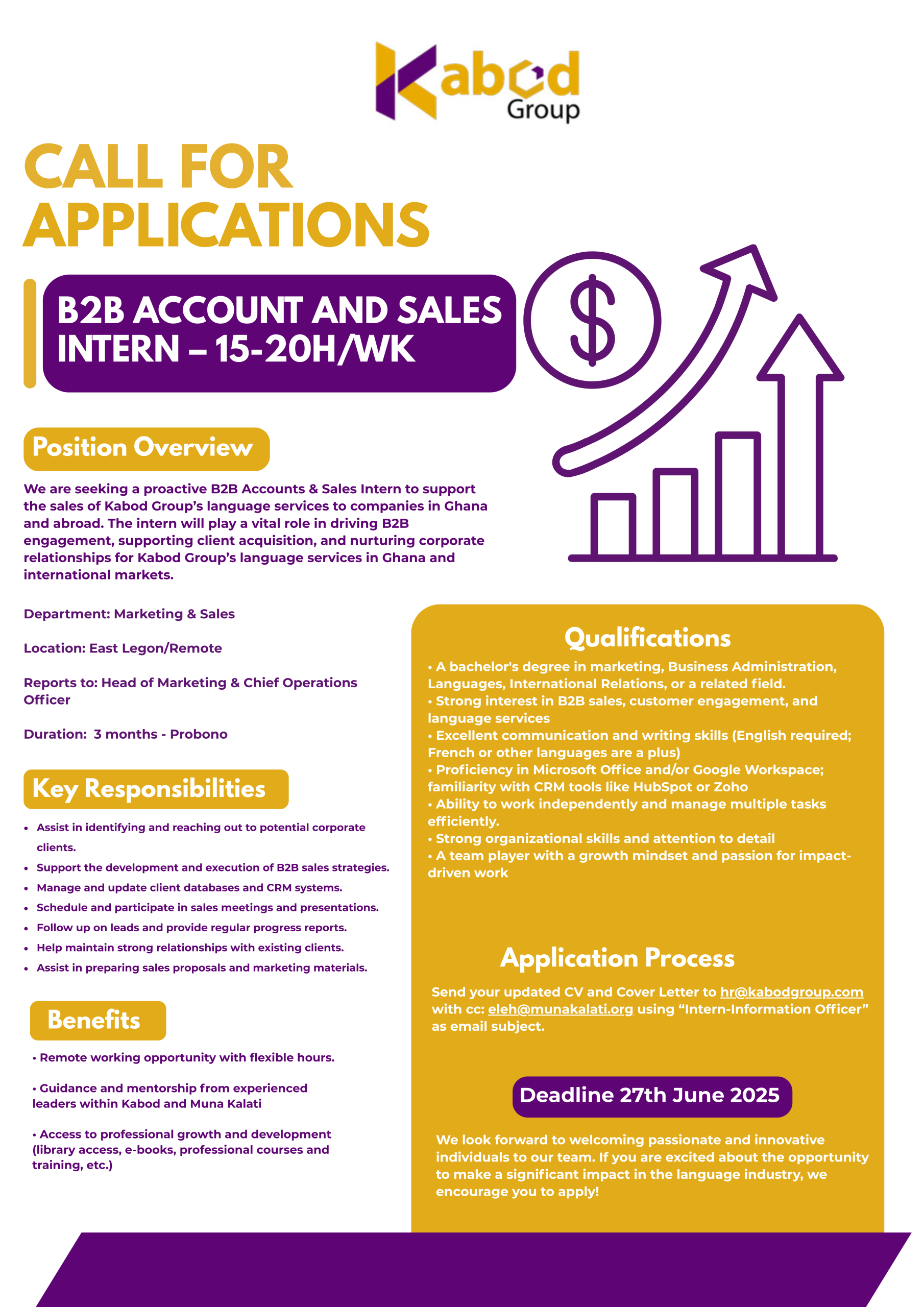5 WAYS THAT MANAGERS AND EXECUTIVES CAN IMPROVE THEIR LISTENING SKILLS
By Christus CODO, People Management Unit, Kabod Group
One crucial aspect of communication that often goes overlooked is listening. As a manager or leader, you must master the art of listening to your employees to understand their needs and concerns.
Effective listening is a skill that can help build trust, increase productivity, and foster an open and positive work environment.
Here are five keys to improve your listening skills or those of your employees :
- Be Present and Engaged

To be an effective listener, you need to be fully present and engaged. This means putting aside distractions like your phone or email and giving your employees your undivided attention. Show interest by nodding your head, paraphrasing their comments to show that you are actively listening and ask clarifying questions to show that you understand what they’re saying.
For example, every week we have weekly review meetings whereby all staff are to present their weekly task and what they were able to complete successfully in the course of the week. During those meetings, our managing director always encourages us to listen to each other attentively and always ask pertinent questions for clarification or understanding. To increase engagement, we discourage staff member’s use of phones or laptops during meetings.
- Encourage open communication
Open communication is vital to understanding your employees needs and concerns. Encourage your employees to share their thoughts and ideas by creating opportunities for them to do so. Regular team meetings, one-on-one sessions, and anonymous feedback forms are some ways to encourage open communication.
- Use active listening skills
Active listening skills are essential in understanding your employees needs and concerns. These skills include paying attention, asking questions, and paraphrasing their comments to ensure you have understood correctly. Avoid interrupting them and avoid making assumptions.
- Listen Without Judgment

It’s essential to listen to your employees without judgement. Even if you disagree with their perspective, it’s essential to understand where they’re coming from and why they feel that way. Don’t interrupt or dismiss their concerns, and avoid getting defensive. Instead, try to see the situation from their point of view and empathise with their concerns.
Imagine you are in a team meeting discussing a project timeline, and one of your team members expresses concerns about the feasibility of meeting the given deadline. As he\she shares his concerns, you actively listen without interrupting or dismissing his thoughts. You allow him to fully express his worries and provide a safe space for him to voice his opinions and you respond by empathising with their concerns.
Also note that throughout the conversation, you must remain calm and composed, refraining from becoming defensive. Your focus is on understanding and finding a resolution rather than engaging in a defensive argument. This approach encourages constructive dialogue and helps foster a sense of trust and collaboration within the team.
- Show Empathy

Empathy is a critical component of effective listening. By putting yourself in your employee’s shoes, you can better understand their perspective and emotions. Acknowledge their feelings and concerns and try to understand how they’re impacting their work. By showing empathy, you can build stronger relationships with your employees and create a more positive work environment and also enhance overall team dynamics and well-being. Let’s consider an example to illustrate the importance of empathy in the workplace.
Imagine a scenario where one of your colleagues arrives late to work, prompting you to reach out and check if everything is alright. To your surprise, they don’t respond to your messages or calls, leaving you concerned about their well-being. When they finally arrive, you approach them and inquire about their situation. It turns out they were experiencing a stomach ache but hesitated to share this information due to feelings of shyness or embarrassment.
In such situations, it is crucial to respond with empathy and understanding. Rather than immediately expressing disappointment or frustration, take a moment to consider the reasons behind their silence. Remember that everyone has their own comfort levels when it comes to sharing personal matters, especially health-related ones.
Instead of telling your colleague that their behaviour was “not nice” for not disclosing their health issue, it would be more beneficial to approach the situation with empathy. Express genuine concern for their well-being and let them know that you are there to support them. Encourage them to prioritise their well-being and suggest that they inform their supervisor or relevant personnel about their condition so that appropriate accommodations, such as working from home, can be made.
By showcasing such empathy in the workplace, you demonstrate that you value the emotional well-being of your colleagues. This approach not only strengthens the bond between team members but also contributes to a more positive work environment. When employees feel understood and supported, they are more likely to engage in open communication, seek assistance when needed, and contribute effectively to the overall success of the team.
- Provide Feedback

Providing feedback is an essential part of effective listening. After you’ve heard your employee’s concerns, provide feedback to show that you understand their perspective. This can help build trust and credibility with your employees.
For example, imagine a situation where one of your employees approaches you with concerns about a lack of clear communication within the team. They express their frustration, stating that they often feel left out of important discussions and decisions. As their manager, it’s crucial to listen attentively, making them feel heard and understood.
Once you have fully absorbed their perspective, it’s time to provide feedback. Begin by acknowledging and validating their concerns (1), assuring them that their feelings are legitimate and important. This validation shows that you respect their viewpoint and are genuinely invested in addressing their concerns.
Next, outline your understanding of their concerns (2) to illustrate that you have comprehended their perspective. For instance, you could say, “I understand that you feel frustrated by the lack of clear communication within the team. It can be disheartening to be left out of important discussions, and I recognize the impact it can have on your work.”
After showing your understanding, it is essential to provide feedback on how you plan to address their concerns or make improvements in the future (3). This demonstrates your commitment to resolving the issue and promotes transparency. You might respond by saying, “Moving forward, I will ensure that communication channels are more inclusive, and important updates will be shared with the entire team. I will also create opportunities for you to provide input and participate in discussions to ensure that your valuable insights are considered.”
By providing specific actions and plans for improvement, you demonstrate that you take their concerns seriously and are actively working towards a solution. This helps to build trust and credibility with your employees, as they can see that their feedback is valued and taken into account.
- Follow-up and take action

It’s crucial to follow up with your employees after you’ve listened to their concerns. This shows that you take their concerns seriously. In this perspective :
- Create a safe environment
Employees are more likely to speak openly and honestly when they feel safe and valued. Ensure that you provide a safe environment where they can share their thoughts and feelings without fear of repercussions. Be respectful of their opinions and avoid interrupting them while they are speaking. Following up with employees after they have shared their concerns is critical. It shows that you are genuinely caring and interested in their feedback and are willing to take action to address their concerns. Take the necessary steps to address any issues raised and communicate the actions you have taken to your employees.
Conclusion
In conclusion, being a good listener is essential in any workplace. By being present and engaged, creating a safe environment, encouraging open communication, using active listening skills, following up and taking action, you can improve your listening skills and build stronger relationships with your team. Remember that effective communication is a two-way street, and listening is just as important as speaking.



